Kabul – Massoud Day: An Unfinished Speech
“Massoud never left his country, and sacrificed his life for the fatherland”
– President Hamid Karzai
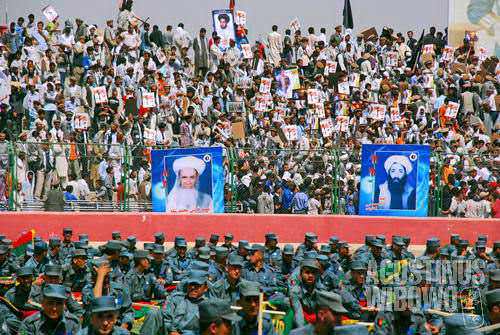
The supporters of Massoud remembering the 6th anniversary of the martyrdom
Two day before the 9-11, a significant event happened in Afghanistan. On September 9, 2001, Ahmad Shah Massoud, one of the greatest and charismatic Afghan’s commanders, was assassinated in a suicide blast by Al Qaeda agents posing as journalist and photographer. He died on September 14, 2001 after few days in comma. This was the first time Afghanistan saw suicide bombing, which in later years become more popular. This was also the beginning why cameras are treated with full suspects as sensitive and possibly dangerous item in Afghanistan. But the most significant of all was Afghan-nation-in-struggle its great leader.
Massoud was regarded as the hero who defeated the Red Army and successfully slapped Islamism fanaticism exactly in the face. His unexpected assassination by two Arab religious extremists was mourned by millions of Afghan. In 2002 the American-raised new government of Afghanistan declared Ahmad Shah Massoud as Afghan’s National Hero, as celebration of victory of Mujahiddin over communism.
September 9 is then remembered every year nationwide as ‘Massoud Day’, to remember the spirit struggle of the hero. Massoud posters are visible all over the country, from big cities to isolated villages, from government buildings to tiny teahouses, from junction of streets until students’ notebooks. Massoud is the poster boy of Afghanistan, and his images far outnumber those of the President. It’s clear that the spirit of Mujahiddin and anti-Taliban that were the characteristics of Massoud, is going to be the spirit of new Afghanistan.
“Mujahid should be more involved in Afghan government,” and, “people should stop calling mujahid as ‘warlords’” said the orators in International Conference on Massoud held two days before in Kabul, as part as a full week programs to remember the 6th anniversary of martyrdom of the hero. People came from many different countries, and even representative from the German embassy were invited to speak.
As a great hero he is, today (9 September), thousands of people are supposed to gather in the Ghazi Stadium to give a respect to him in his death anniversary. I had got my press card from the Ministry of Defense yesterday, after 4 days of waiting time since the application. All reporters, photographers, and cameramen were supposed to gather in the ministry at 6 a.m. I had to wake up at 4 because the car of our office had to pick up a reporter whose house is 10 kilometers away.
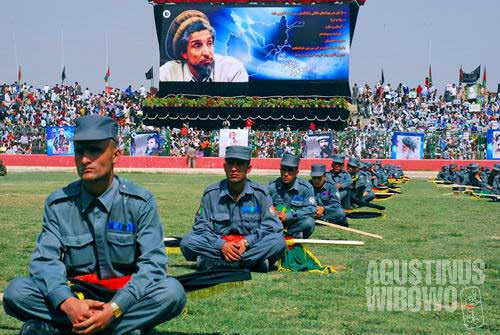
Soldiers are ready in Ghazi stadium
There are some photographers from international media, like AP, BBC, AFP, etc, all with bazooka-like lenses. Photographers from local media, including me, usually possess cute cameras. At least our office gives me D80 kit which is not too bad. The ministry is lack of coordination, and at 6:30 we are still stuck there because they had no car available to carry all media personnel to the spot. At the end, they managed to borrow some cars and the media crews were divided into several shifts.
Karzai is always an extraordinary person in Afghanistan. All occasions attended by him will arise to high-degree of security measurement in whole city. Helicopters are flying around, roads are sterilized, and people are body-checked to the surface of the skin. Photographers and cameramen are not an exception. Remember that Massoud was sacrificed by a bomb disguised as a still camera. Camera turned to be enemy in disguise for Afghan authorities.
For this reasons, all of the media crews are lined outside the Ghazi Stadium. About 40 of us, and 10 by 10 of us are asked to enter the gymnasium building next to the stadium for a scrutinizing check. All of equipment should be put on the floor, including camera, video camera, note books, recorders, pen, watch, passport, wallet, ID cards, key, everything that is not part of our body but our very clothing. Then we are asked to stand in line about 5 meters away from our equipment, and the bodyguards searched our body by hands. Meanwhile, our belongings behind are searched by anti-terror dogs. They know what to smell. After the dogs ‘OK-ed’ the s Then the guards follow to check all the items, one by one, thoroughly. I forgot to leave my 400 bucks inside my wallet, and I turned my head back little bit to see whether they didn’t take my money, and a guard shouted, “Don’t turn back!”
We have to believe their credibility.
After all items are checked and guaranteed that there is no bomb in disguise (even pens and watches can be disguised to pistols by clever weapon makers), we are allowed to collect our items back. Nothing lost, of course. The bodyguards are paid well so they don’t need to take little bucks from wallets. A cameraman from a local TV station, after this mind messing body search, takes up his tripod and leaves, forgetting his big video camera. The bodyguards ridicule him.
Then we are brought to the Ghazi Stadium. It is 7:15. It is the stadium of which central ground was where Taliban used to conduct executions to criminals, like stoning for women committing adultery and arm amputating for bicycle thieves. At that time thousands of male spectators watched this ‘moral conducting’ event with full curiosity. Now the Taliban criminals at the green football ground is replaced by about five hundred Afghan national soldiers on the right and another five hundred Afghan young policemen on the right, all sitting under sun with quite gloomy expression because of long waiting and fierce heat.
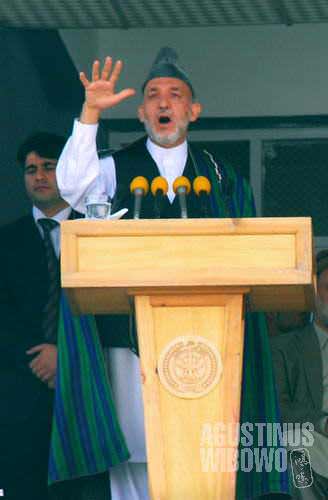
Because of the president, security is very tight
The soldiers and the guards, for sure, came much earlier than we did. One side of the stadium is filled by uniformed guard and another side is by uniformed police. I see a sea of grey and another sea of green. Those selected to sit on the ground are not that lucky. Not only they have to sit and stand up and sit and stand up again to practice how to hold the tricolor Afghan flag properly.
We have the president bodyguards all around us, with quite unfriendly face and similarly unfriendly machine ripples. They walk around us, and not hesitatingly shout around, “Turn off your mobile phone!!!” The journalists grumbled. “I have been in Ghazi Stadium for several times, and I always make phone call from here,” said one. “How can we make news if we cannot contact our office?” asked the other rhetorically.
For the sake of safety of the Very, Very, Very Important President, the area has to be sterilized from mobile phone signals, even if we stand more than 30 m away and 4 m below him. They will not take any risks. A compromise was reached though, between the journalists and president’s security team. A reporter is allowed to make a phone call one time, only one time, after getting an oral permission from the head of the security team, and during the call he has to be watched closely by the bodyguards.
Luckier than the journalists, policemen can use the Afghan flag to hide their mobile phone when making calls. Discipline is something unknown.
The audience, slowly, filled up the seats. People bring posters of Massoud and start yelling the name of God. “Narai takbir….!”, “Allahuakbar”, (Voice of Greatness? Allah is GREAT!!!) are heard continuously. A few thousands of people, apparently many come from Northern provinces of Ningrahar, Panjshir, Parwan, and Kunar, turn the barren stadium into dots of colors. A giant Massoud sign board is prepared at the middle of the audience podium.
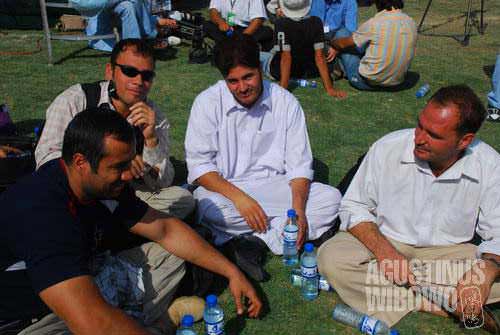
Bored journalists
The most important man, the President, is known to have the habit to come at least 2 hours late. Maybe this is the American security protocol that he has to follow. But it has been much more than two hours of waiting, and nothing significant happened. Slowly, the podium of ambassadors and foreign and dignitaries are filled up. Many of the media crew already get bored and started to chat around or eating food on the grass just like having a picnic surrounded by thousands of people yelling the name of God.
Karzai came just few minutes before 10. And as he is the only person to wait for, the program started afterwards. About a thousand policemen and soldiers on ground stand up immediately. National anthem is played. The thousands of public audience also stands up, and the big banner of Massoud appear slowly showing his gentle smile. It is moment of silent. Only pride of a nation sings in chorus with the flowing anthem.
Now the program starts. A man comes to the podium. He talks in Farsi, talks about the meaning of Mujahid struggle, about Massoud’s struggle, etc. etc. Then another speaker comes. I don’t quite understand what he is talking about, and as other foreigners on ground, I prefer to observe the atmosphere around. Many reporters are getting bored as well. Either they just turn on the tape recorder and chat by themselves, or they write unnecessary things on the notebook. One reporter even writes, ‘bismillah irrahman irrahim (by the name of God)”, the routine saying that is never absent from any speech, into his notebook.
It takes quite long time for each speaker to talk. And there were not only three of them. I just wish that Karzai will appear earlier.
And at last he came out.
Karzai, a Pashtun man, now addresses his audience in Dari, the language of Massoud. He says that Massoud is a great hero, the national hero of Afghanistan, the great mujahid who fought bravely against the enemies of the country, against extremism, terrorism, and darkness. “Massoud never left his country, and sacrificed his life for the fatherland,” says the President.
He continues talking. It is quite a long speech.
Suddenly, gunshots are heard.
“DUAR…..DUAR… DUAR…”
The audiences opposite of the President’s tribune start to scramble.
“DUAR….”
Now the space emptied and people run in panic.
“DUAR…”
I see two or three people lays on the seat. Are they dead? Or are they just lying down to avoid the gunshots?
Where the gunshots from? Is this a terrorist attack?
Gunshots are heard again.
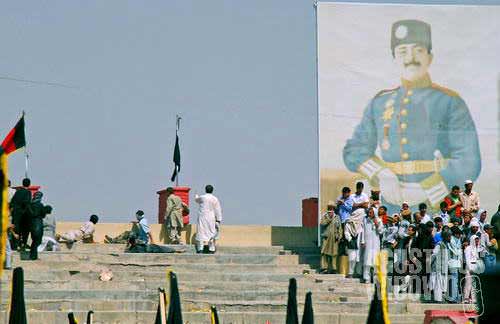
All in panic
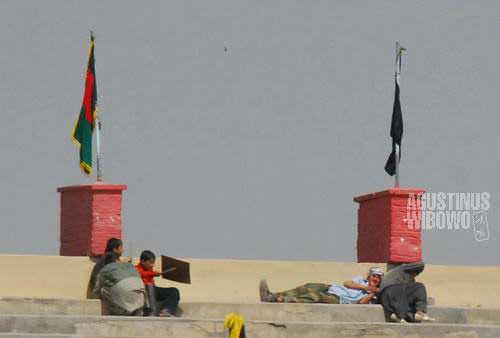
… and hiding
Mess…
But Karzai still continues his speech. What happened actually?
The next time I turned back my head to the podium, I saw the president bodyguards already took Karzai away. He was evacuated, followed by those foreign dignitaries.
Later I know, the last words of Karzai was, “Dear brothers and sisters, with respect to everybody, we are finishing our ceremony here.” He didn’t finish his long speech.
Later I know, it was thousands of people outside the stadium who were refused entry to the arena by Karzai’s American trained bodyguards were angry and threw stones. The stones were mistakenly perceived as gunshot attacks and assassination attempt by the bodyguards and they replied by firing to the air.
Later I know, according to the safety protocol, the situation was considered as out of control. The stones of over-enthusiastic Massoud supporters forced Karzai to escape the tribune and have his speech, which was praising Massoud’s bravery not to escape the country and sacrificed his life for the fatherland, unfinished.
Later I know, the Minister of Defense confirmed there were indeed gunshots from outside the arena. No matter whether there were shots from outside or just stones which invited shots from Karzai’s US-trained bodyguards, people ran away in panic and everybody was thinking there was an attack to the quiet ceremony.
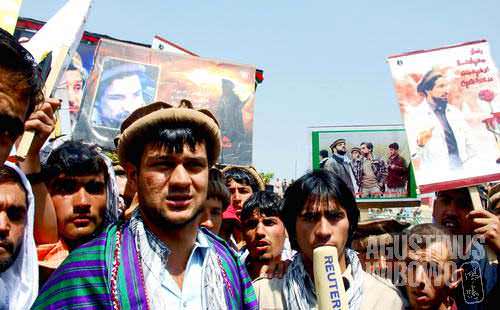
Angry crowds flock into the stadium
Now, after the President group left, the bodyguard left, situation in Ghazi Stadium is only owned by the audience. The angry Panjshir supporter jumped into the arena, asked the journalists to interview them.
“We love Massoud. A hundred of fifty of us came from Panjshir, Parwan, here to Kabul just for our beloved Massoud. But why they didn’t allow us to enter? Whose country is this? Afghanistan is ours,” said one in Karzai-style cloak.
A yell of “Allahuakbar” follows afterwards.
These people who are relatively whiter than normal Afghan, some with blue or green eyes and very much Western physical appearance, hold Massoud posters and yell emotionally.
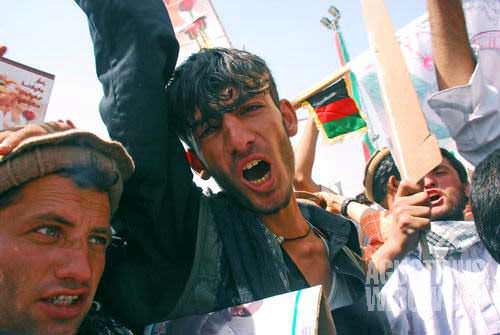
Angry, angry, and angry
They jumped through the wired fences. They jumped through the seat. They jumped to Karzai’s tribune and occupied it. Suddenly, a big photo of Karzai disappeared. I didn’t know it was taken by the officials or scrapped by these angry mobs.
My friend also rescued me. “They are crazy. We should leave away.”
“These Panjshir people, they are really shit. They just think they are the only Afghans and we are not Afghans,” said my reporter friend, a Tajik.
“But Massoud is also from Panjshir,” I denied.
“Yes. Massoud is like a flower growing from a pile of shit.”
Massoud and image of Panjshir people among different ethnics of Afghans always have a controversial position. For some he is a great hero, but for others he is not. And many Kabul friends of mine perceive Panjshiris simply as dangerous people.
Shortly afterwards, Karzai, from his palace, announced the necessity of holding a talk with Taliban insurgence, just immediately after his unsuccessful ceremony of remembrance of the anti-Taliban national hero.
Hundreds of cars plastered with posters of Massoud, with their noisy honks and enthusiastic loyalists yelling the name of the hero, plied around the city. The next destination is Panjshir Valley, the land of Massoud, where a sacred pilgrimage is to be held to remember the national hero, one of which today’s Afghanistan still badly needs.






Leave a comment